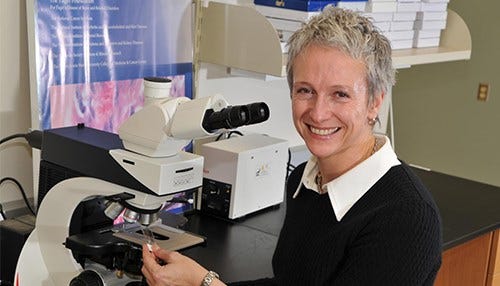IU School of Medicine Physician Receives DOD Grant

Subscriber Benefit
As a subscriber you can listen to articles at work, in the car, or while you work out. Subscribe NowTreatment responses for patients with metastatic bone cancer are the focus of work that has garnered an IU endocrinologist a $1.2 million Department of Defense grant. Theresa Guise will use the funding to try to understand several events that decrease quality of life for patients being treated for the disease.
Guise wants to find the role of the cellular environment of the tumor-bone on the patients ability to metabolize glucose and how a high-fat diet plays a part.
“One of the reasons we are studying high-fat diets in mice is to mimic our population in Indiana,” Guise said. “It is known that once cancer is in the bone, it causes bone destruction and the risk of fracture is increased. Diabetes also increases the risk for bone fractures. Our recent data show that bone destruction in the setting of a high-fat diet can induce diabetes. We believe this high glucose load can further impair bone quality, leading to a downward spiral.”
The initial phase of the study will look into older mice with breast cancer that had spread to the bone. The research will determine insulin secretion, bone loss and other factors when they are fed a high-fat or low-fat diet. Another phase of the study will investigate ways to stabilize glucose metabolism in obese mice who have metastatic bone cancer to try to prevent changes that produce diabetes. Data from these two phases will be used with information from breast cancer patients where the disease has spread into the bone to study similarities in the "molecular cascade" that often leads to higher risk of fractures.
“All three arms of the study will also determine how much fat gets into the bone, blood and other organs and if blocking a specific protein called TGF-beta will interfere with the molecular cascade that causes patients to develop diabetes. TGF-beta is released from the bone during the process of bone breakdown from cancer or cancer treatment. Ideally, the next step will be clinical studies in humans with breast cancer,” Guise said.
Guise is the Jerry and Peggy Throgmorton Professor of Oncology and a co-leader of the Tumor Microenvironment and Metastasis program at IU Melvin and Bren Simon Cancer Center.
